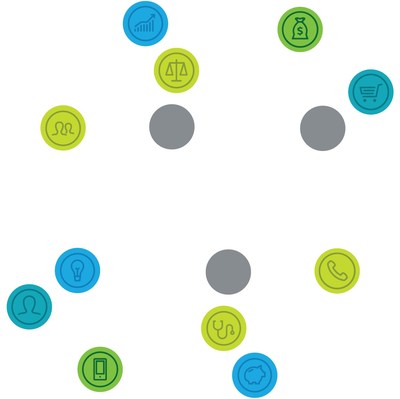NEW YORK, May 8, 2017 /PRNewswire/ -- Around the globe, shared service centers (SSCs) have proven their commitment to becoming more efficient and effective, according to Deloitte's 10th biennial "2017 Global Shared Services Survey." Providing insight into the reality of the wide-ranging scale of modern business, the survey represents more than 1,100 shared service centers headquartered in 37 countries.
"Our survey demonstrates that organizations cannot take a one-size-fits-all approach to their shared service model," said Noemie Tilghman, principal, strategy and operations at Deloitte Consulting LLP. "Just two years ago we saw a focus on evolution into a global business services model, and now a rapidly-changing marketplace, emerging technologies, and a competitive talent pool have significantly shifted the outlook. Organizations should find innovative ways to capture value through shared services while embracing the next frontier of technology and functionality to enhance value creation and service to customers."
Amid an uncertain business environment and rapid pace of change, many organizations are focused on creating efficiencies and refining processes within their shared service centers and are finding new ways to create value beyond transactional processes. As a demonstration of their success, SSCs continue to deliver increased value year after year, with 73 percent of survey respondents reporting productivity increases of 5 percent or higher. In addition, organizations around the world continue to constantly refine and enhance their SSC delivery models.
According to the Deloitte report, some of the key trends that will continue to shape the shared service landscape are:
- Staying close to home: The offshore, onshore dilemma – This year's results show that organizations are reevaluating their shared services location strategy with a decided "onshore" North America trend emerging. Proximity to existing operations or headquarters is becoming a higher priority. Results show a growing number of companies moving their shared service operations to U.S. soil, with the U.S. unseating India this year for the No. 1 location for companies considering a new or relocated center. Additionally, many organizations surveyed have near-term plans to establish new shared service centers – or consolidate existing ones – to further optimize their geographic footprint.
- Rise of the robots – Robotic process automation (RPA) and cognitive intelligence are rapidly emerging technologies that could transform shared service centers by dramatically reducing the money and effort required for routine, labor-intensive tasks. According to the survey, 8 percent of organizations surveyed are already harnessing the power of RPA; 26 percent are conducting or planning a pilot; and 24 percent have begun initial research. Technology is also disrupting the fabric of shared services and leading to fundamental changes in how SSCs operate and deliver service to customers. More than one-third of respondents (36 percent) believe RPA will deliver savings of 20 percent or more, while 9 percent expect a savings of 40 percent or more due to the introduction of this digital labor force.
- The war for talent rages on – Skilled and well-trained talent is hard to come by, and attracting and retaining talent remains a challenge for shared service centers. The survey finds that the number of SSCs surveyed experiencing turnover rates of 20 percent or higher has tripled since 2015, with the average turnover rate increasing by 2 percent overall. To be competitive, organizations are considering nontraditional staffing solutions, with 75 percent revealing they have looked at alternative talent models, including part-time and virtual options as well as the use of contract/contingent workers. Additionally, companies are doubling down on strengthening culture (62 percent), providing job rotations beyond SSCs (46 percent) and providing financial support for continuing education (43 percent).
- Multifunction centers are the new norm - The goal to find new ways for SSCs to create additional value has led to more multifunction centers. This year's survey shows that the number of SSCs with more than three functions continues to rise dramatically from 20 percent in 2013, 31 percent in 2015 and now 53 percent in 2017. While Finance and HR remain the most often included functions, the inclusion of knowledge-based and non-traditional front and middle office functions continues to rise.
In order to be efficient with their future plans, respondents provided insights into their strategy. For instance, when asked how to improve their shared services journey, 44 percent of respondents cited they would have increased their focus on automation and robotics. However, the need for greater change management (54 percent) and more visible leadership alignment (49 percent), remained the most common lessons learned for organizations year over year.
"The next frontier of shared services is on the horizon and robotic process automation is just the beginning. Artificial intelligence and data analytics will transform the way shared service organizations plan and adapt," said Tilghman. "Our results show an industry being disrupted significantly in the months ahead, so it is imperative to use these insights to develop and evolve to retain talent, to improve cost savings, and to become more efficient by investing in a truly digital labor force."
The Deloitte survey, conducted since 1999, identifies emerging trends in shared services based on the most recent response as well as comparing and contrasting responses from past Deloitte Global Shared Services surveys and shares concepts and insights from multiple geographies, industries, and revenue bases. The goal of the survey is to provide the latest thinking to help organizations that are beginning their shared service journey learn from others and to infuse fresh ideas into more mature shared service operations. This year's survey includes input from more than 330 companies from around the globe and provides data for more than 1,100 SSCs globally. Survey participants represented companies from most sectors with annual revenues ranging from less than $1 billion to more than $25 billion. For more detail, please read the Executive Summary and download the Infographic.
About Deloitte
Deloitte provides industry-leading audit, consulting, tax and advisory services to many of the world's most admired brands, including 80 percent of the Fortune 500 and more than 6,000 private and middle market companies. Our people work across more than 20 industry sectors to deliver measurable and lasting results that help reinforce public trust in our capital markets, inspire clients to make their most challenging business decisions with confidence, and help lead the way toward a stronger economy and a healthy society.
Deloitte refers to one or more of Deloitte Touche Tohmatsu Limited, a UK private company limited by guarantee ("DTTL"), its network of member firms, and their related entities. DTTL and each of its member firms are legally separate and independent entities. DTTL (also referred to as "Deloitte Global") does not provide services to clients. In the United States, Deloitte refers to one or more of the US member firms of DTTL, their related entities that operate using the "Deloitte" name in the United States and their respective affiliates. Certain services may not be available to attest clients under the rules and regulations of public accounting. Please see www.deloitte.com/about to learn more about our global network of member firms.
SOURCE Deloitte
Related Links
WANT YOUR COMPANY'S NEWS FEATURED ON PRNEWSWIRE.COM?
Newsrooms &
Influencers
Digital Media
Outlets
Journalists
Opted In







Share this article